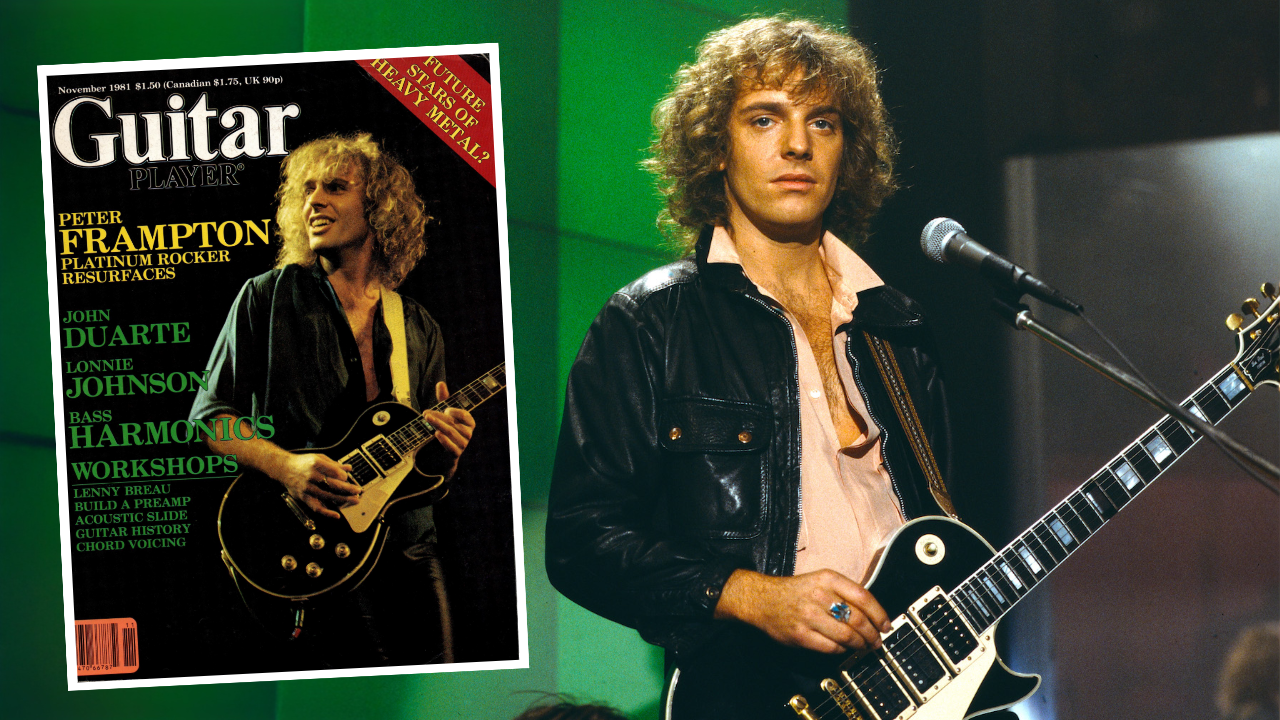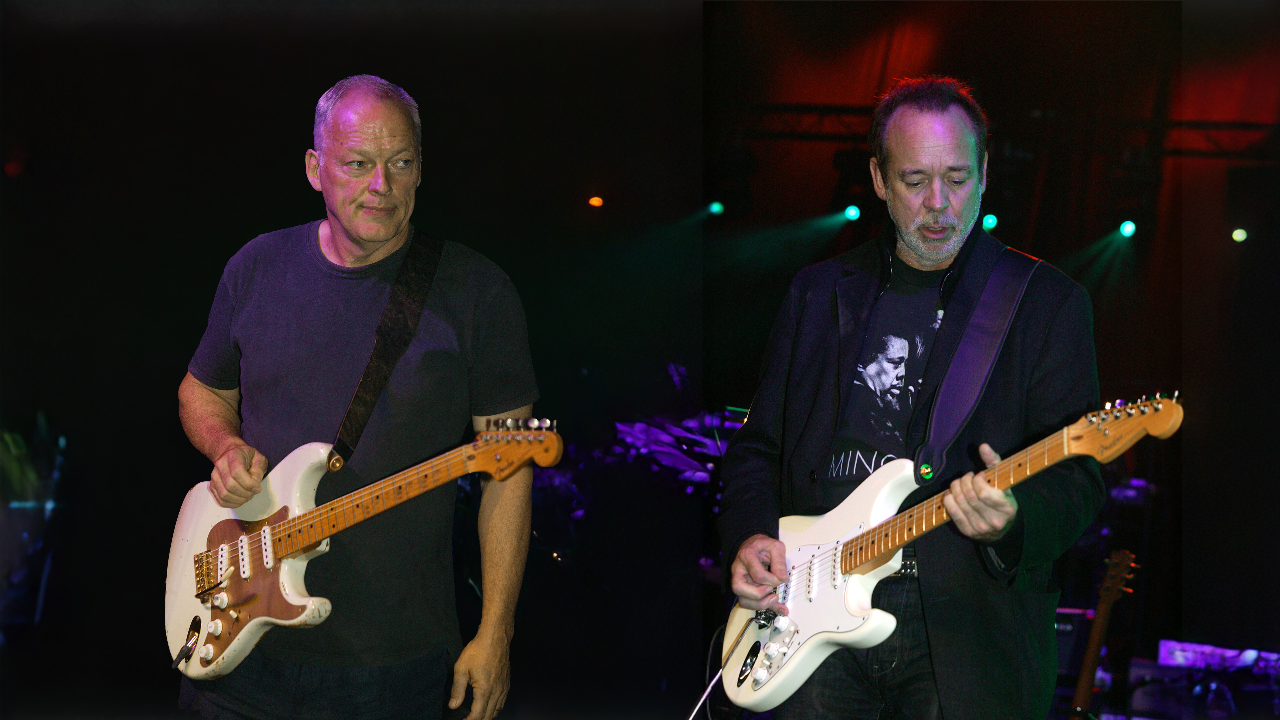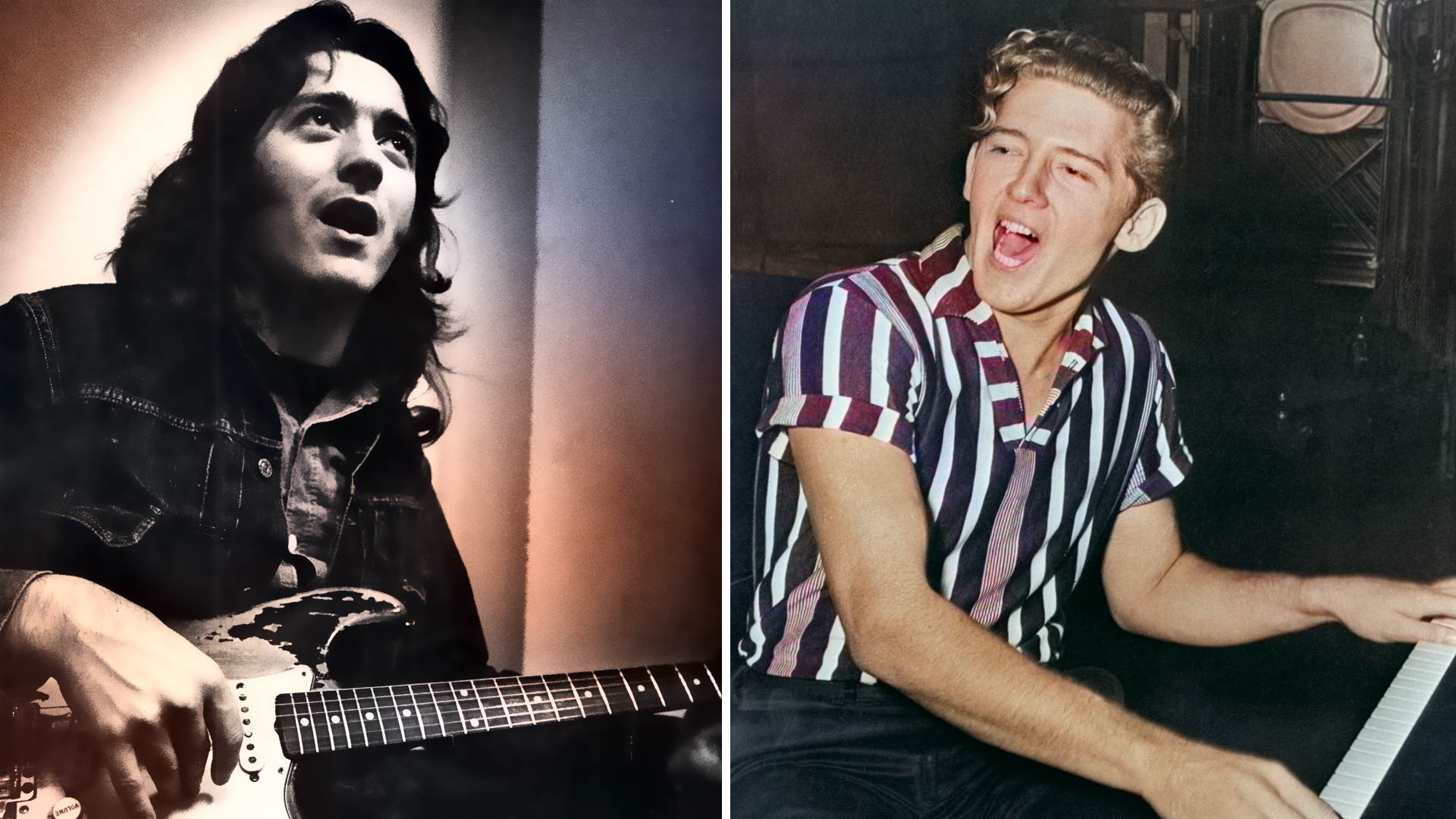“The guitar was my savior”: How John 5 battled through personal tragedy and mental health struggles to become a six-string sidekick for David Lee Roth, Lita Ford, and Rob Zombie, and Mick Mars' replacement in Mötley Crüe

One might not think that Dolly Parton, Rob Zombie, k.d. lang, and Nikki Sixx would share any kind of common ground, but there is something they all emphatically agree on: John 5 is one of the most creative and exciting guitar players they have ever encountered.
They’re just some of the music stars who sing the praises of the Telecaster-toting axe ace in the new documentary I Am John 5. The film also includes glowing testimonials from the likes of Joe Satriani, Rob Halford, the late Gary Rossington, Peter Criss, Michael Anthony, and Rudy Sarzo, among others.
All of which has the subject of the movie feeling vaguely verklempt. “It’s so strange and unbelievable to me,” John 5 says. “Everything that’s happened to me has exceeded all of my wildest dreams. When I was starting out, I was just hoping to make a living as a session player. I never thought I’d sign an autograph, let alone have Dolly Parton talking about me. I still have a hard time trying to fathom where life has taken me.”
As success stories go, John 5’s tale is pretty spectacular stuff. Arriving in Los Angeles in the late ’80s from his hometown of Grosse Pointe, Michigan, the 17-year-old guitarist (born John Lowery) quickly found work playing on movie and TV soundtracks, followed by album sessions for Rick Springfield and David Lee Roth. He played live dates with his friend Lita Ford, but owing to a long-standing fear of planes, he preferred studio dates and travel that didn’t involve flying, until he signed on with k.d. lang for a world trek from 1996 to ’97.
Enthralled by Marilyn Manson, he reached out to the shock rocker, who hired him and rechristened him John 5. Donning elaborate costumes and goth-horror makeup that suited his new moniker, John 5 became Manson’s onstage foil and right-hand man. A pair of studio albums (2000’s Holy Wood and 2003’s The Golden Age of Grotesque) and several world tours followed before they parted company in 2004.
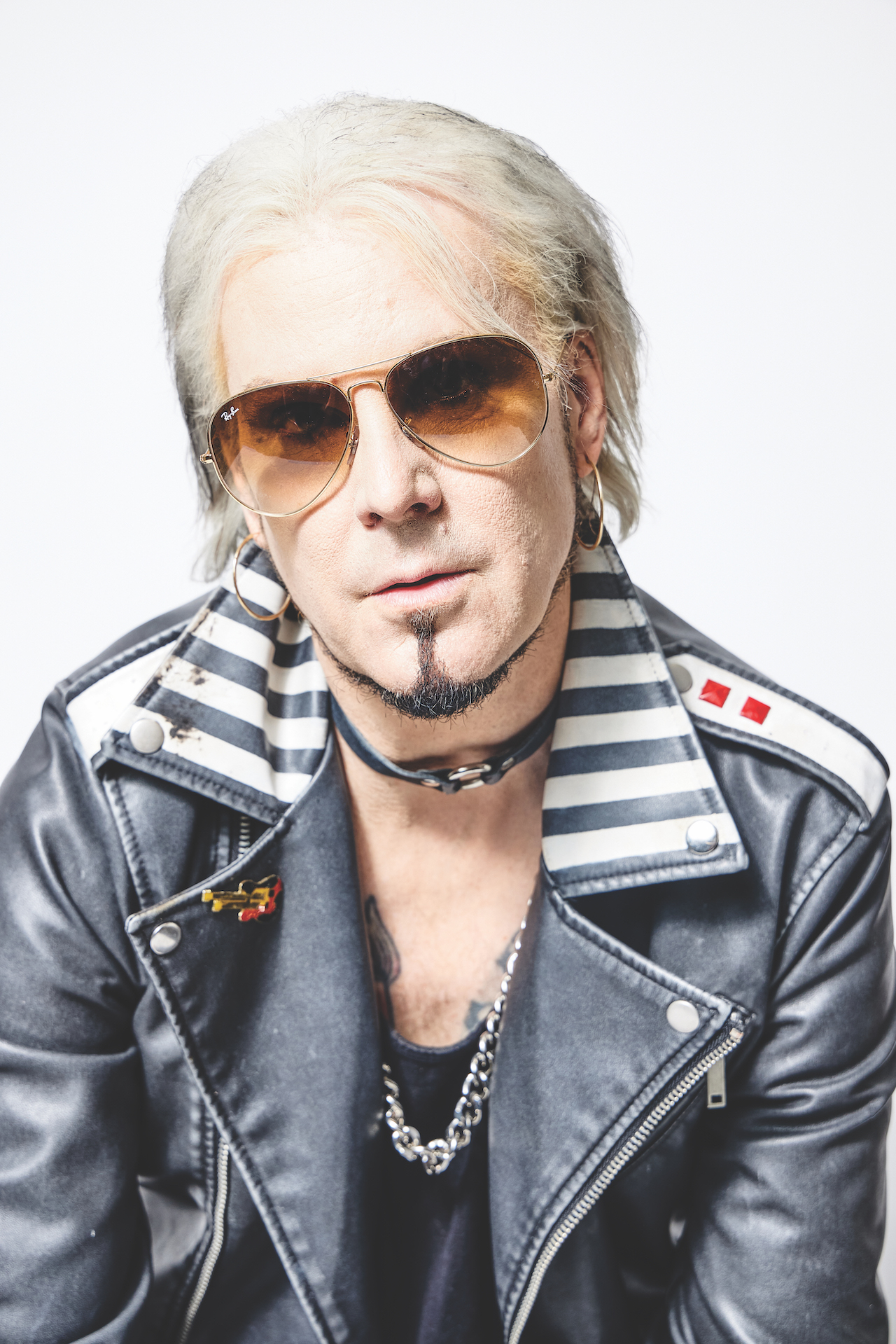
John 5’s next longtime gig – with heavy-metal/horror star and sometime filmmaker Rob Zombie – took him even higher. In addition to his blitzing guitar chops, John 5 served as a significant writing partner on a series of Zombie’s albums and even wrote the score to the singer’s supernatural thriller, The Lords of Salem. Their mutually beneficial professional relationship seemed destined to continue, but in 2022, John 5 received the kind of offer he couldn’t – and didn’t – refuse: taking over for Mick Mars in Mötley Crüe.
I Am John 5 traces the broad strokes of his career in a fast-paced and highly entertaining film directed by Chantal Savage, and produced by the guitarist Mike Savage, and Barry Pointer. But some of its most illuminating segments recount the earliest chapters of John 5’s life, particularly how, as a preternaturally gifted teenaged guitarist, already versed in country and bluegrass (thanks to the TV comedy show Hee Haw) as well as rock (thanks to Kiss), he struck a deal with his mother to play nightclubs – none of which he could legally patronize – as long as his schoolwork didn’t suffer.
“I was always very driven and was strict with myself about playing, but I followed other rules, too,” he says. “My mom said, ‘If you miss school, if you don’t get up in the morning even one time, you’re not going to play these clubs anymore.’ Truth is, I thought that was a very smart rule, even though I sometimes got home at two in the morning and had to get up by seven. But I never missed a day of school. I was always respectful of things like that. Plus, my mom knew that I wasn’t drinking or smoking or doing anything.” (Apparently, “or doing anything” didn’t include occasionally going home with much older waitresses that he met in the clubs.)
I Am John 5 isn’t mere rock-star idolatry, however. When he agreed to participate in the project, John 5 made it clear to the producers that he wasn’t interested in a standard-issue puff piece, and in several particularly powerful segments he reveals his struggles with mental illness that he says began back in 2003, after he received word that his sister Lynne had died.
“I was on tour with Manson, and I knew that my father was sick with cancer,” he explains. “Lynne and my father weren’t talking because she was involved with drugs. But he was really sick, so she went home to make peace with him. She was on methadone, and she died.” The new film features footage of a dramatic onstage moment from 2003 when John 5, still reeling from his sister’s passing, threw down his guitar and confronted Manson in a fit of rage and anguish.
The guitarist hadn’t yet processed her death when his sister Denise succumbed to cancer, followed by the cancer deaths of his mother and father. More tragedies followed: His best friend and guitar tech, Ruben Valesco, died, and soon after, his brother-in-law Dennis passed on.
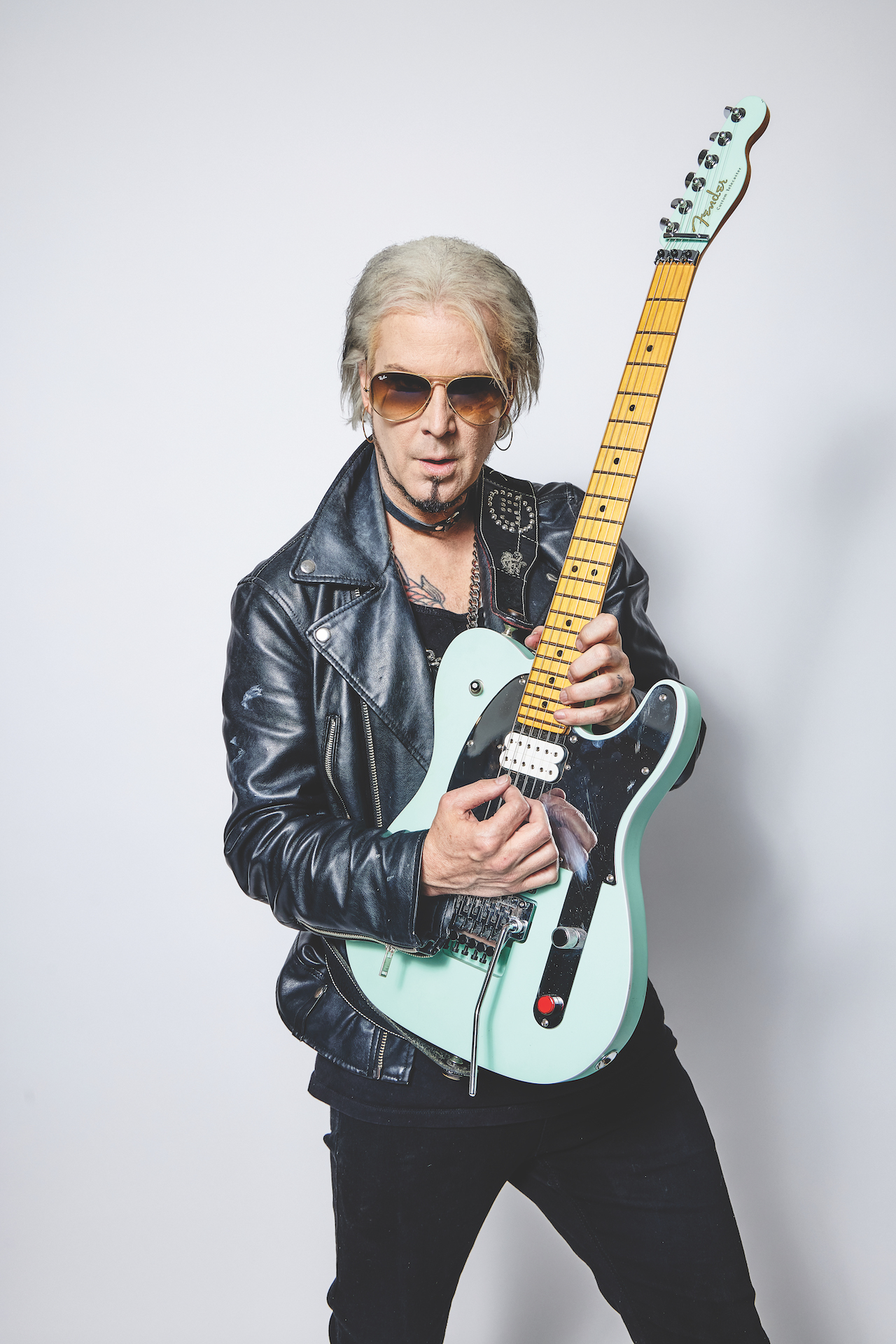
“It made me crazy,” John 5 says. “It started when I was with Manson, and it went on while I was with Zombie. As anyone knows, it’s traumatic to lose a family member, but I had all of these deaths in a short period of time. I didn’t know what was going on. I was in a tailspin.”
The guitar turned out to be my savior
He started to experience panic attacks, which manifested themselves in breathing issues and digestive problems. At times, he was so mentally and physically overwhelmed that he couldn’t get out of bed. Resisting self-medication – “My parents smoked and drank, and Lynne did drugs,” John says. “The thought didn’t cross my mind” – he finally turned to therapy.
“I was trying to block things out, and my therapist said I needed to try to occupy my brain in some other way,” he says. “The guitar turned out to be my savior.”
Playing the guitar obsessively came naturally to John 5 (he claims that he’s never gone a day without the instrument in his hands), but in an effort to alleviate his grief, he played even more than usual. He began to record solo albums at a steady clip. Starting with 2004’s Vertigo and on through 2021’s Sinner, he’s released 10 albums that show off his astonishing, multigenre-blending guitar style (everything from hyperspeed chicken pickin’ to molten-metal shred).
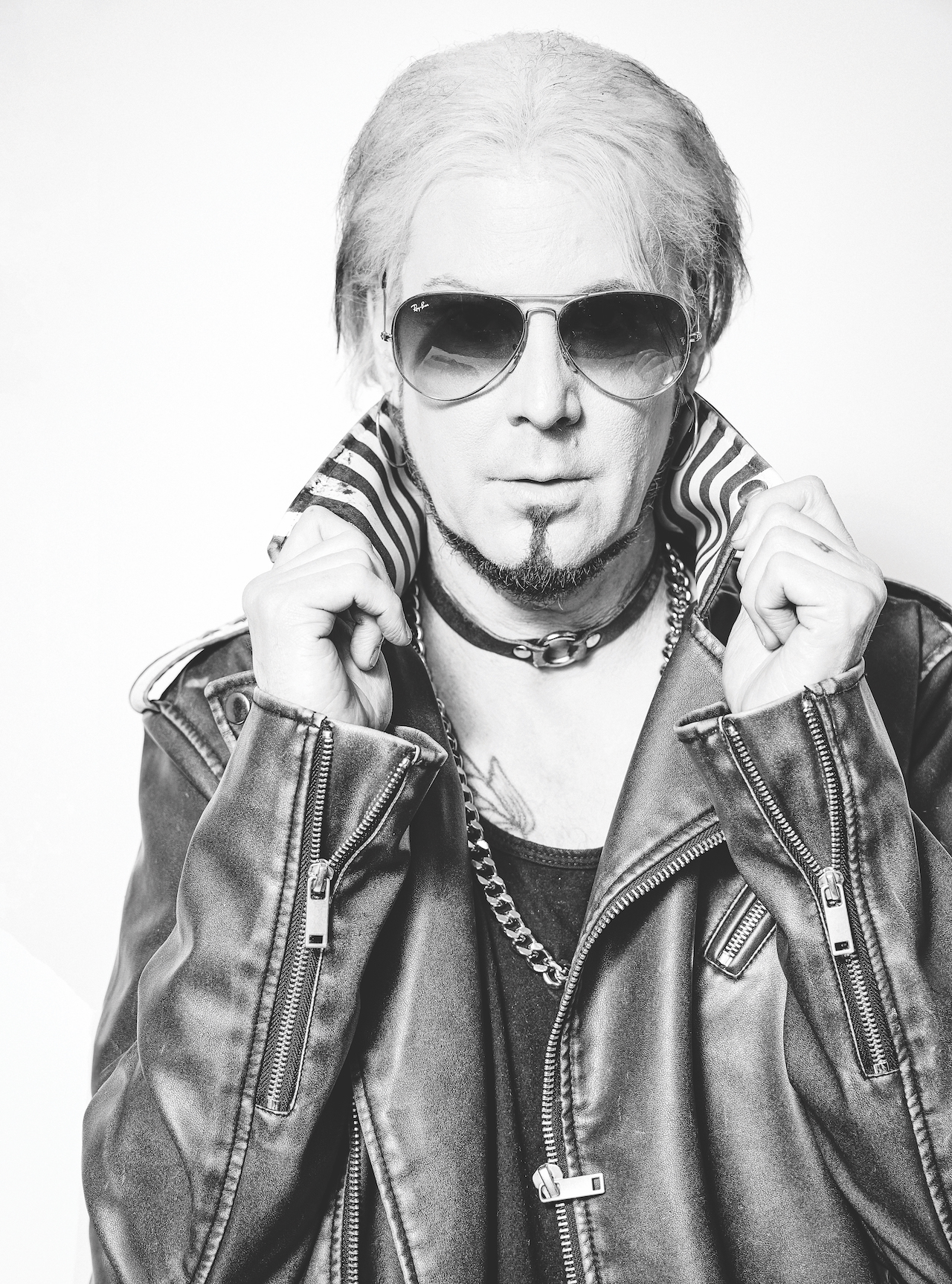
Little by little, John has gained perspective on what at one time felt like an unending nightmare. He occasionally checks in with a therapist for tune-ups, but he says he feels healthier and happier than he has in years. He remains tight with his surviving sister, Mary Kay, who turns up at various points in I Am John 5. (In one fun scene, the two drive by the guitarist’s old high school football field. Reminiscing about how he was never accepted by the jocks, he laughs, “I’ll show you!”)
John and his wife, Rita, just celebrated their 15th wedding anniversary, and he’s still pinching himself over his membership in the Crüe. Between touring and recording with the band, he’s carved out some time to record a new solo song for I Am John 5 called Hollywood Story. A luminous instrumental rock ballad, brimming with wondrous melodies and jaw-dropping chops, it encapsulates his compositional and virtuoso skills in one sparkling four-minute package.
More than anything, John hopes the documentary can provide a kind of public service.
“Even though the film is about me, I’m not going, ‘Look at me! Look at me!’” he says. “What I really want to do is shine a light on my experiences and show people who want to get into this business, or even people who might be dealing with mental illness, that you can go after your dreams. You can get through things without drugs and alcohol. There is hope. It’s possible to pick up the pieces and keep going. That’s what I’m trying to do with the film – inspire people to turn negative energy into something positive.”
In the documentary, you say that one of the main reasons why you wanted to be a session guitar player was because you feared flying. How did you get over it?
“I’m still not over it. It started in the ’70s, when I had this horrible flight to Palm Springs. We went through this storm, and it went on forever. It felt like somebody was shaking me back and forth, and it wouldn’t end. I was so sick. Ever since then, I haven’t liked to travel.
“When I joined Mötley Crüe, I found out they took private planes everywhere. So I told them, ‘I’m not good on those things,’ and they were like, ‘Ah, it’ll be fine.’ The first tour we did in South America, we had this massive plane – 600 seats or something. We had our road crew and Def Leppard and their crew. There was a problem with the landing gear, and we had to dump the fuel. It was a nightmare. But you know, you just gotta do what you gotta do. I tell myself, ‘It’s fine, it’s safe.’ I have to remind myself and just do it.”
If k.d. lang hadn’t asked you to go out on tour, do you think you would have stuck to your initial plan and stayed a session guitar player?
“Well, I’d done some touring, but not a real tour where you have a tour manager and a real everything. I was doing sessions and Lita Ford asked if I’d do some live shows. I said, ‘Yeah, sure.’ So if an opportunity was there, I would take it. But k.d. lang was my first real professional tour, and boy, did I get thrown into the deep end. She had guests coming to the show – Madonna, Peter Gabriel. It was a trip.”
In the film, you say that there hasn’t been a single day in which you haven’t played guitar. You also mention having OCD.
“Correct.”
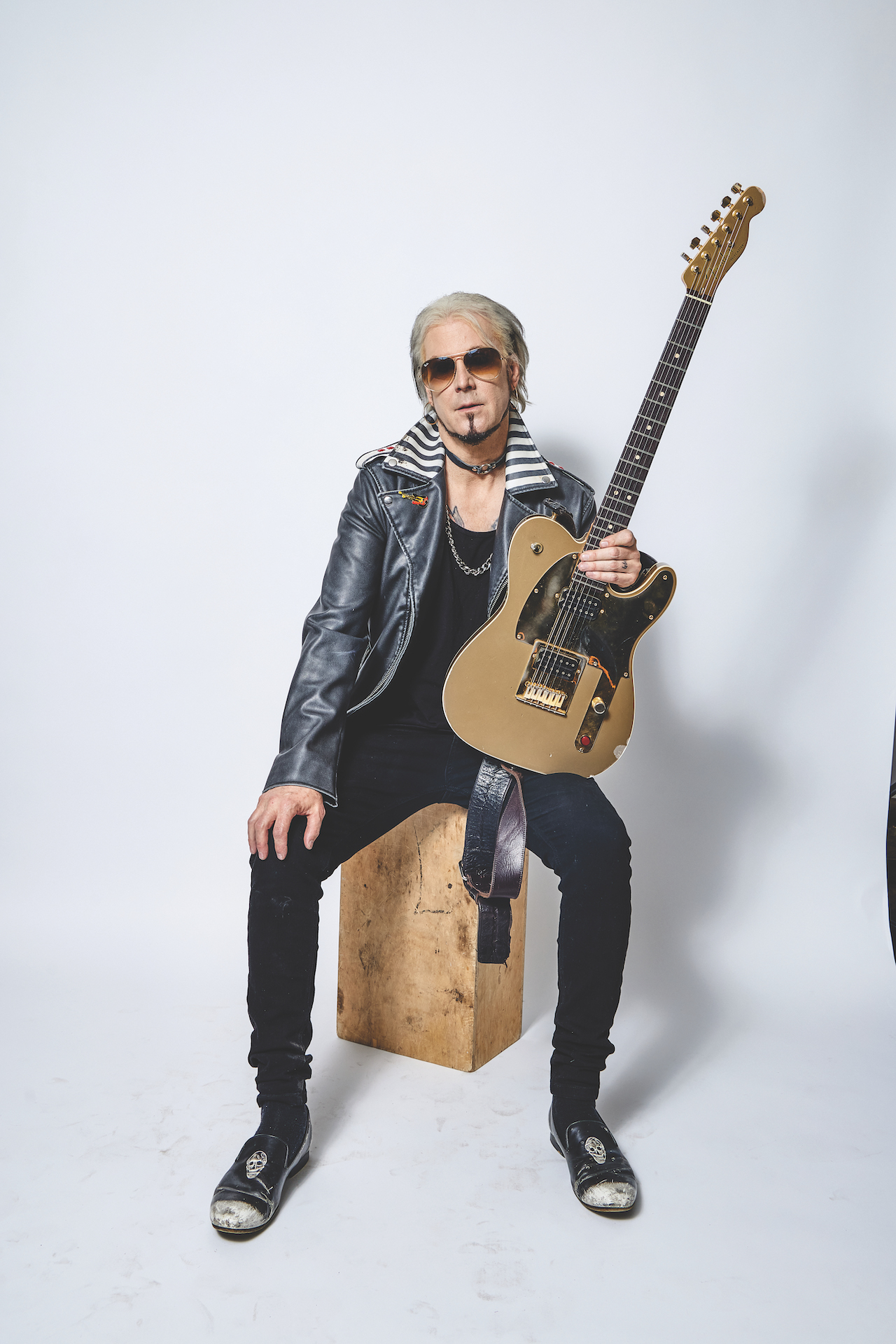
Do you see any correlation there?
“Oh, sure! I mean, I play the guitar and I clean the house. That’s what I do – I play and I clean. I’m just being honest. I mop and sweep and clean the toilets. It’s very rewarding. I make the beds and do everything you can imagine.”
Does your OCD. ever get into a dangerous or unhealthy lane? You know what I mean…
“That’s a fine question. What I do is, I’ll play guitar for four hours, and then I’ll stop and I’ll clean the house for a couple hours. But it doesn’t get dangerous. I mean, I’m not on my hands and knees looking at a speck.”
Okay, so you’re not like Howard Hughes.
“I love Howard Hughes. To me, it’s rewarding when I can look at a room and be like, ‘Oh, I feel good about this.’ And I’m active. If I’m home playing guitar, I’m just sitting there, but I’m moving around when I’m cleaning. It’s kind of healthy. I get in my 10,000 steps every day.”
As a kid, you assiduously mimicked players you saw on Hee Haw – people like Buck Owens and Roy Clark. In hindsight, do you feel as if there was any sort of compulsive behavior behind that, or were you just having fun?
“I don’t know, but it’s a good question. I was so young. Thinking about it now, I just had to get my guitar lesson down, even if it meant staying up all night. If I couldn’t figure something out, I would keep at it. I would fake being sick, and I’d play guitar until I got it. That happened quite a bit, so that could be a tendency, I guess.”
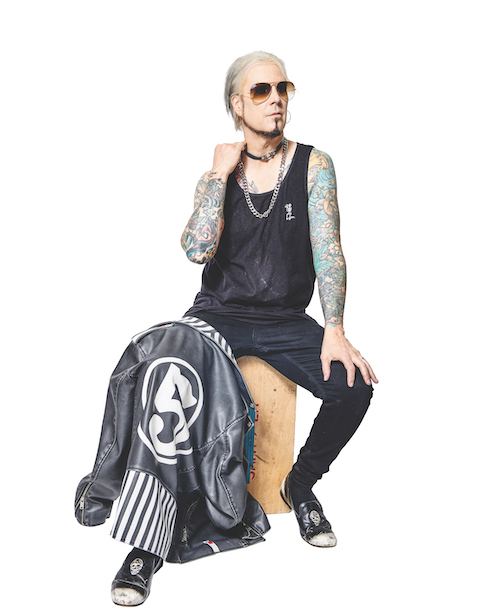
How about the outrageous costumes and makeup you came to wear? Was it a way of overcoming shyness or social anxiety? Did it give you confidence?
“I believe so. I was very confident onstage with a guitar in my hand, but not confident at school because I put so much attention into music and guitar. When I was onstage, I had it down, so I was going to be confident. I’m confident talking to you, and you’re confident talking to me because you’ve been doing this for many years. But if we were going to talk about math, we would both be nervous about it.”
It wasn’t out of spite or anger or anything Marilyn did. I just snapped. It was so strange
We would be, because I can’t do math at all. [John laughs] Let’s stay on the idea of music as emotional therapy. In a way, do you think this started earlier in your life, say, when you were a teenager?
“It’s funny – I’ve heard a lot of artists speak about having tough childhoods. I had an incredible childhood, like something out of Norman Rockwell. I just loved to play guitar. I loved anything that was done very well. If it was sports or someone riding a bike or music or anything, I was obsessed with anyone doing something to the pinnacle. And, of course, I was through the roof when it came to people who were unbelievable on the guitar.”
The footage of you losing it onstage, throwing down your guitar and going after Marilyn Manson is harrowing. The two of you had always play-acted off each other, but this time it was very real.
“I hadn’t slept for days and days. I was in a state of shock. I don’t even know how I was playing a show, but I wasn’t tired. That’s how strange it all was. I was probably up for five days. When that incident happened, it wasn’t out of spite or anger or anything Marilyn did. I just snapped. It was so strange. During the confrontation, he said, ‘Pick your guitar up! Don’t bring your family into this.’”
Did he apologize afterward for saying that?
“Oh, of course. Yeah, he was… It was just terrible, and I feel bad about it. It was captured on film, but what can you do?”
When you sought professional help, your therapist told you to try working through your grief by burying yourself in an activity, and, not surprisingly, you chose the guitar.
“Yeah. I never did an instrumental record before then. I became obsessed with instrumental records – that’s all I listened to – and I was like, ‘Okay, I’m going to do an instrumental record.’ I started out not so crazy with Vertigo, and then it became gradually crazier and more intense. Look at the album titles: Vertigo is something my mom had when she was really sick. Songs for Sanity was the second one – there you go. The Devil Knows My Name: I always thought I had a curse on me because of all the things that were happening. Requiem, God Told Me To – it all ties in.”
Did it ever come up in therapy that obsessive guitar playing was a way of hiding from your feelings? Was there the understanding that you had to confront your feelings in some other way?
“Of course. And, of course, I dealt with it that way, as well. It still affects me today – completely. I’ll feel it creeping in. But I’ll say to myself, ‘I know who you are. I know what you are, and I’m going to overcome this.’”
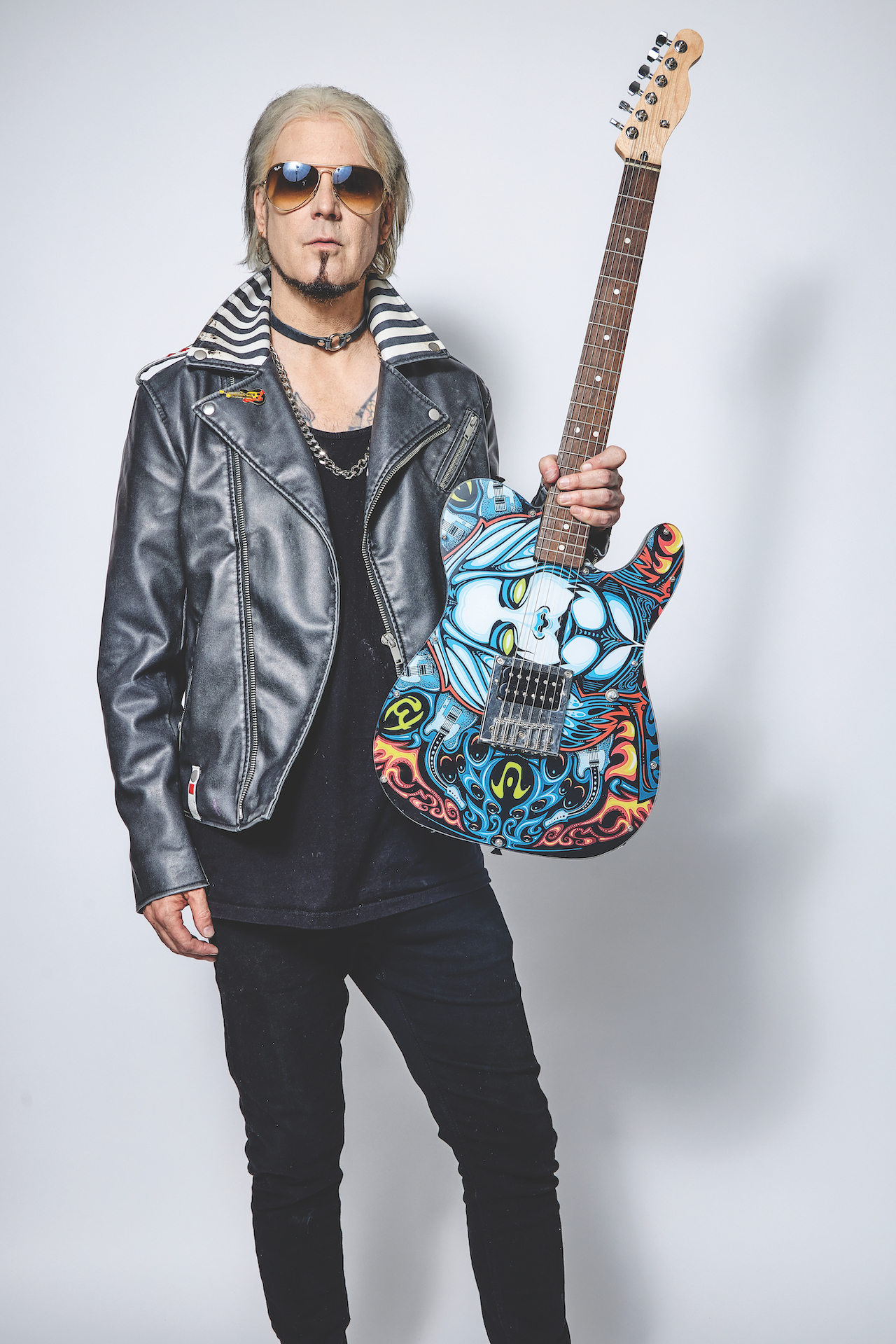
You occasionally go back for therapy?
“Yes, on and off. But you know, you can get through it by doing positive things, and by doing things that will inspire people and help them. If my music helps people just a little bit, then I feel like I did my job. I do my solo tours. There was a little girl who was really ill with cancer. She was very young and in rough shape. She came to the show, and I brought her up onstage and the place went nuts. Four years later, she came back and she’s doing great. I brought her up onstage and the crowd went crazy. It was great.”
That is what it’s all about.
“Yeah. Like I said, experiences like that make me feel like I did my job.”
Speaking of jobs, let’s talk about Mötley Crüe. You and I talked recently, and you said you were starting to record new music with them.
“That’s right – new music! We went into the studio with [producer] Bob Rock and did some songs. It was really cool because it’s something I haven’t done before. We all got in the room together and played, and that’s how we tracked. It’s so unorthodox nowadays to just get in one room and play all at the same time and record at the same time. It was incredible.”
Are you “John 5-ing” the music in some way? You’re coming in with riffs and song ideas?
“Yeah. And it’s incredible because, I mean, Nikki Sixx – and I’m not just saying this – he’s such an incredible writer and lyricist. It’s natural for him. He’ll call me and say, ‘Dude, check this out,’ and it’s so good. I’m like, ‘Oh, my God. How could my friend, somebody I go to the mall with, grab something out of thin air like this?’ And it’ll be really, really great. Being with him and the other guys, and working with these people that really know how to write great songs, is an incredible experience.”
Your new song Hollywood Story is great stuff. I like the shred flash in the riff – it’s a motif throughout the song, but it changes a little each time.
“That’s right. It’s interesting because it is shreddy, and the song is mid-tempo. If the song were up-tempo with the same guitar stuff, you’d be like, ‘Whoa, this is really intense.’ But when it’s a mid-tempo song with that nice groove, and it’s still shredding, it’s like you’re listening to a piece of classical music, where the violin is gorgeous, beautiful, and fluid. The violin is moving, but it’s not distracting because it’s so fluid. You don’t really notice that it’s really flying all over the place. That’s kind of what I tried to accomplish with this piece.”
Sonically, it’s very pleasing to the ear.
“It starts out with bass and a nice melody – it’s very primitive and elementary. It’s just acoustic guitar and a distorted electric guitar tone, but I didn’t make it harsh. I made it very warm and smooth. It’s got some crazy-cool stuff in it. There’s a diminished chord in it. There’s a flat five!”
What kinds of effects did you use on Hollywood Story?
“Just a Boss Super Overdrive and an EVH head.”
I understand you have a new Fender signature model coming out that’s based on the Ghost Telecaster.
“I do, but I’m not talking about it that much. I mean, I’ll talk to you about it. The Ghost has been very successful, and this new one is called the Phantom. It’s black and it’s gorgeous. I’m trying to get it in my hands soon. You know, all these titles mean something: Ghost, the Phantom, Hollywood Story, Sinner, my album Strung Out. They’re not just titles.”
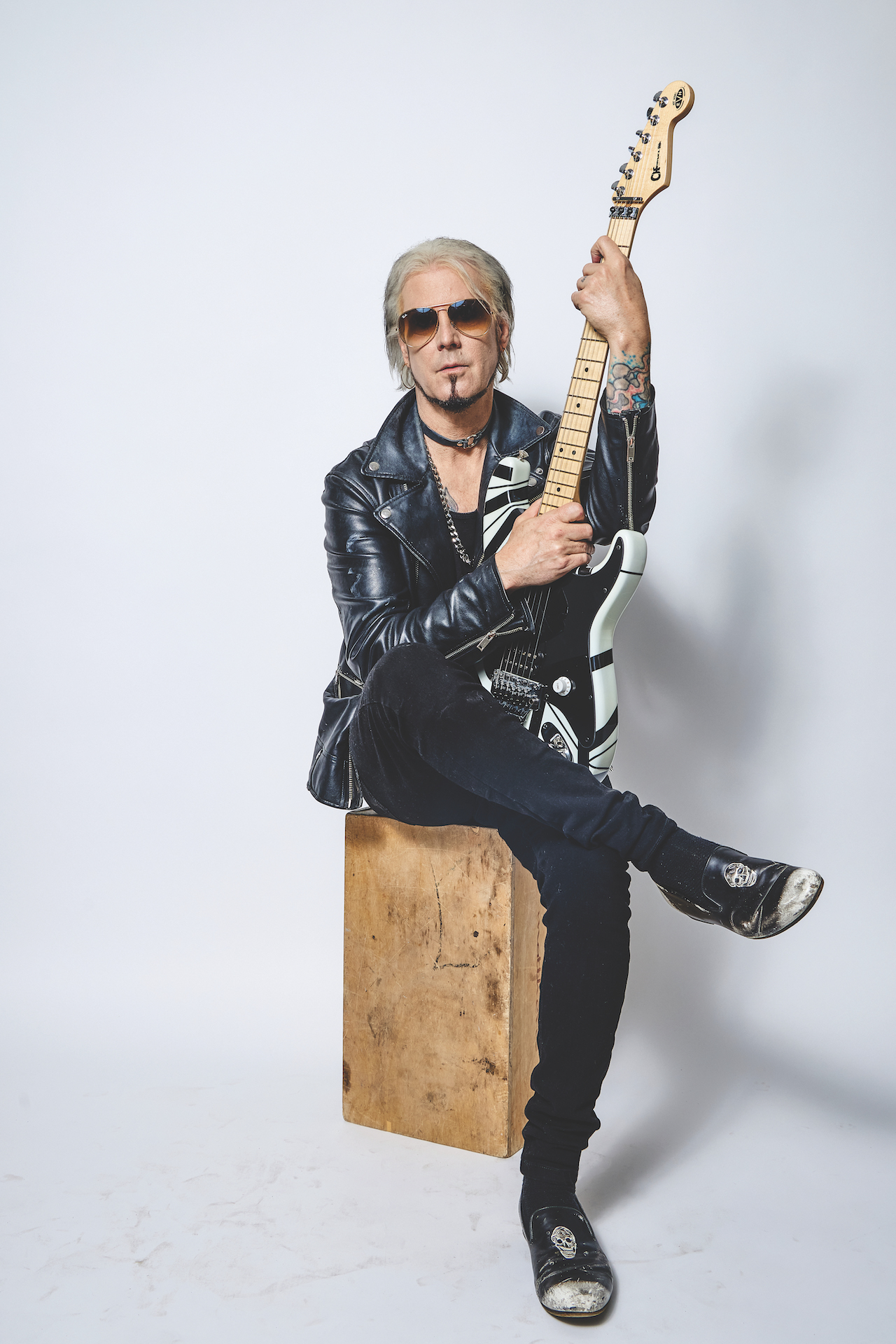
Anything about the spec or design you can tell me about the Phantom?
“It’s going to be all black anodized, like a darker pickguard, but metal. We’re going to have a Floyd Rose on it, but there will be one that comes without a Floyd. Like the Ghost, it will have binding, of course. I just can’t wait to get my hands on it so I can road test it. That’s what I did with the Ghost – I road tested it for so long, because when I put something out, I want it to be the best, and I want people to be happy with it. If my name is associated with it, I want it to be incredible. And with Fender, it always is.”
Obviously, the guitar has a Floyd Rose because you’ve been using one with Mötley Crüe.
“Yeah, so I need it. At first, I was like, ‘What makes this thing work?’ I mean, my first guitar was a Stratocaster. I loved Hendrix, so I was ‘experienced.’ [laughs] I played with a whammy bar, but then I got away from it because I didn’t want it to be a crutch. I don’t want to offend anyone who uses one. I’m just being honest. This is the most honest interview I’ve ever done.”
Get The Pick Newsletter
All the latest guitar news, interviews, lessons, reviews, deals and more, direct to your inbox!

Joe is a freelance journalist who has, over the past few decades, interviewed hundreds of guitarists for Guitar World, Guitar Player, MusicRadar and Classic Rock. He is also a former editor of Guitar World, contributing writer for Guitar Aficionado and VP of A&R for Island Records. He’s an enthusiastic guitarist, but he’s nowhere near the likes of the people he interviews. Surprisingly, his skills are more suited to the drums. If you need a drummer for your Beatles tribute band, look him up.




